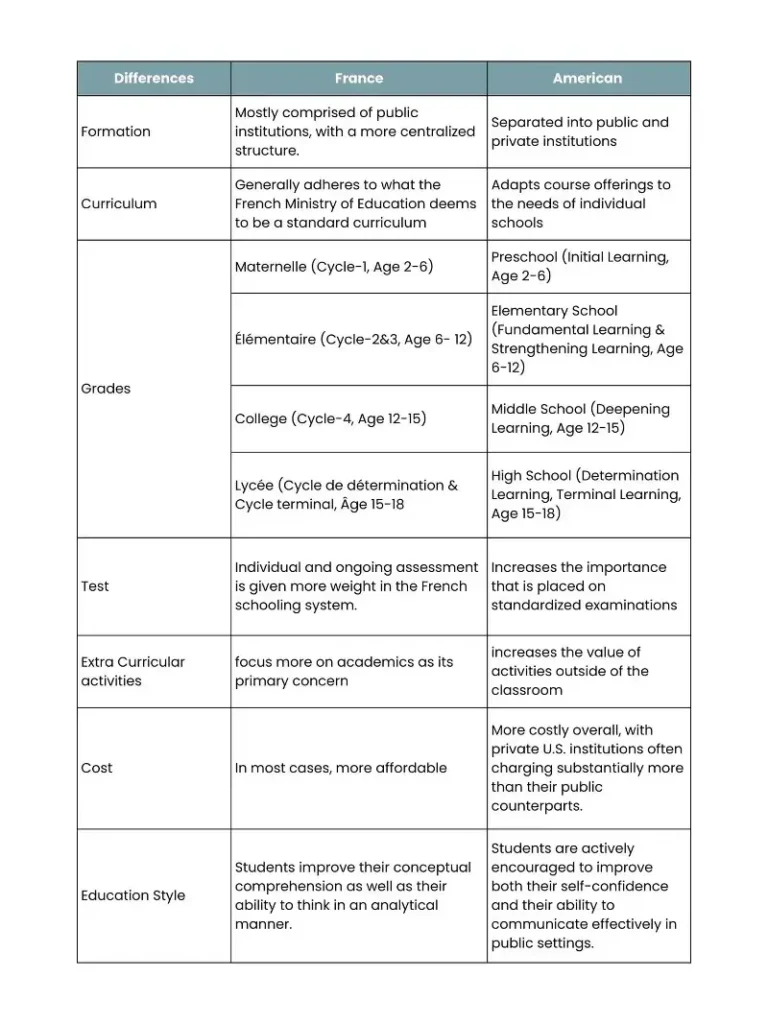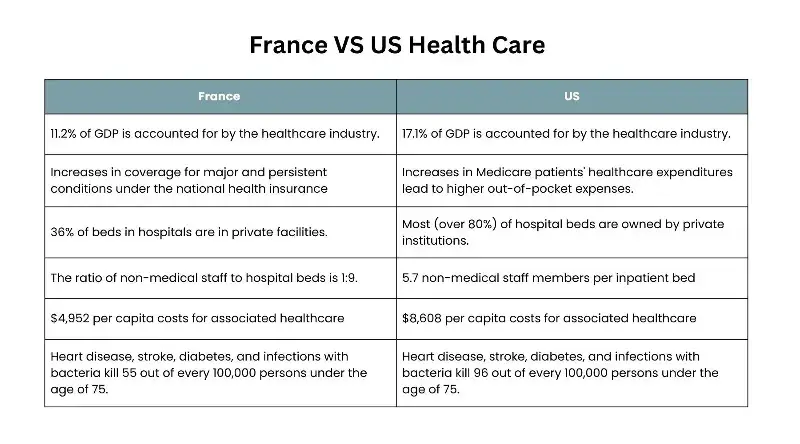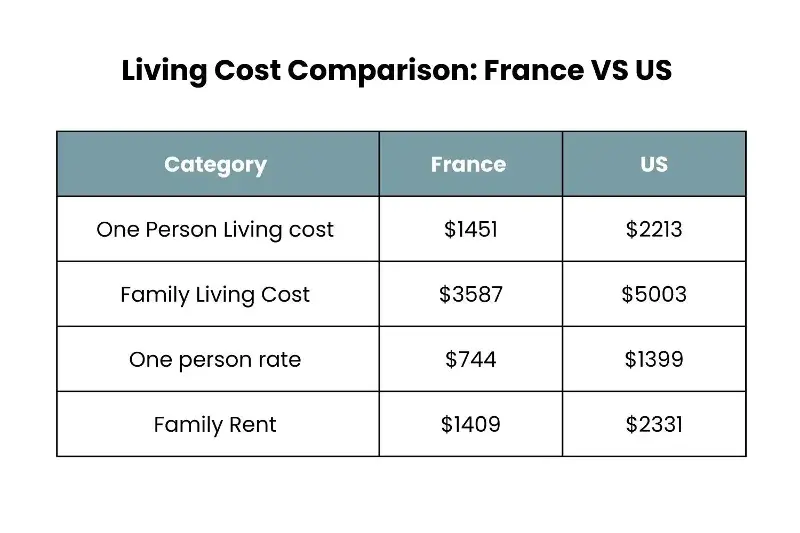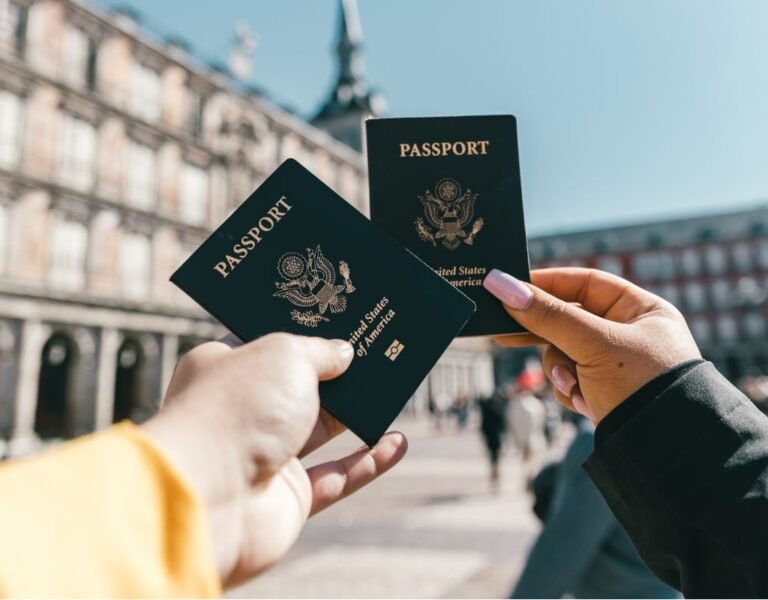Living in France Compared to the USA: Bonjour or Hello?
|
Ever thought about moving to France? Thinking about pursuing your expat dream, but not yet ready to commit? It’s time to learn more about life in the USA vs. in France. Stay with me to find out more.
Living in the United States certainly has an abundance of upsides, but it lacks one major feature: social security and safety. Being sick or studying, for example, in the United States is notoriously expensive. And frankly, sending your kids to school is a scary endeavour to say the least.
I lived in France for 2 years while I completed my studies, and have offered my oldest daughter the same opportunity to learn about other ways of life. I loved living there and found France to have a tremendous social safety net, enabling citizens to work and take care of themselves without being concerned about issues such as healthcare, education, etc.
You won’t earn as much as you would in the United States, but living is certainly simpler – and cheaper!
This difference is just one of many to explore. We recently took the leap and moved away from the US and haven’t looked back.
If you’re just starting to think of where you’d like to move abroad, find out more by checking out my How to Move Abroad e-book to help you make the right decisions and start your transition off on the right foot.

Get Started Today!
How to Move Abroad
A Workbook to help you make the right choices
Use our easy to follow roadmap to help you find the perfect location to start your new life.

Prior to moving to France, I had a strictly rosy picture of my to-be home in my head. Was it all that I imagined it to be?
I’m going to share it all with you.
Life in France: Living La Vie en Rose

I originally moved to France to study. The two years I spent obtaining my Bachelors there opened my eyes to a new way of life as an American. Even having already lived in Spain, I was still surprised by how differently people lived right over the border.
In French, a common sentiment is known as “joie de vivre,” which translates to “joy of living.” French values soon became clear to me: food, art, relationships, activities and relaxation.
French Lifestyle: L’Art de Vivre
Like Americans, I appreciated how French people work hard. But, unlike Americans, French people also prioritize slowing down and enjoying down-time. Mornings are late, lunches are long, shops close early, and weekends are invaluable. Good food, wine, an hour spent on a café terrace with a friend, and appreciating art are daily pleasures – not reserved for vacations.
Speaking of vacations, French people have about five weeks of paid vacation every year! The workweek is also capped at 35 hours. What a difference, right?
French Eating: Relationship to Food
High quality food is religion in France. Everything from the source of the ingredients to how the meal is prepared is special. What you buy, where you buy it, and how often you buy it matters! The majority of French people do buy at least one fresh baguette every day. I highly recommend asking your French friends for advice on the best cheese, bread, wine, etc. – they know their stuff!
You can even make grocery runs into social events, boosting your social networks and health. You can pick up helpful tips from the individuals you socialize with on how to prepare nutritious and delicious dishes.
Meals and the Community
In France, meals are social events when friends, family, and/or coworkers come together.
A typical meal (in restaurants and in French people’s homes) includes a glass of wine and perhaps an appetizer, salad, bread, entrée, cheese or dessert, with a coffee to conclude.
Whether you’re at home or in a restaurant, there is plenty of time built into meal times, meaning there is no rush, and meals are truly a social event.
Considering moving abroad? Discover the pros and cons of relocating to a new country. Ourcomprehensive guide highlights the benefits of international living, cultural experiences, and career opportunities, alongside potential challenges like language barriers and homesickness.
Life in the US: The Land Of Opportunity

Life in the US varies depending on your location and what specific aspects of life you are looking at.
Generally speaking, the US is a diverse and prosperous country with a high standard of living. We live to work in the United States and as a result our work ethic is globally unmatched. This means that we work most of our lives to own our homes, cars and other property, and often suffer the aftermath of our work habits in our mental and physical health.
But its not all doom and gloom! This frenetic pace of work means that opportunities to make money abound, and unlike France, going from rags to riches is a very real possibility in America.
Booming Business
In America, most anyone can start a business. In fact, recent research has proven America is indeed the best country on Earth for entrepreneurs. The business sector is admittedly unmatched and there is generally a niche for most things, and someone who will pay for it! Starting a business in France is much less lucrative since business just happens more slowly
Competitive Job Sector
Not interested in starting your own business? So, you’re looking at a job. Unfortunately, the US is no longer the job powerhouse it once was. There definitely aren’t as many jobs out there as there used to be, although if you know how to tweak your cv, you’re bound to get something fairly quickly. Not so in France.
Whereas it is common in North America to get a degree in English and work in marketing, this doesn’t happen in France. It’s a lot easier to get a job working for someone based on your experience and your skills in the US than it is in France. Formal qualifications are much more important in France, which means that if you are planning on moving there, the easiest thing to do is for you to get an in company transfer from your US company.
In France the subject chosen at university leads to a job in that sector, which for most of us means we’ll be looking for work for much longer than planned. So this is an important factor to keep in mind when choosing where to live.
No Time to Pause
Own the US, once you start on the ladder of success, you must keep moving. Standing still is only sometimes an option, especially if you want a family or build a significant career. The success rate is proportional to the amount of work you are willing to perform and the lifestyle you want to have right now.
France is much more forgiving in this sense and sabbaticals as well as time off can be requested with very little kick back, especially when its time to have a family. This makes balancing family life and a career much more manageable, especially for women. The law allows for a minimum of 16 weeks paid maternity leave and 4 weeks paternity leave, as well as 1 hour of breastfeeding per day. Employees can also request parental leave for up to 3 years per child which can not be refused by the company.
The US allows for an unpaid leave of 12 weeks for a new mom.
Relationship to Debt
The USA is a debt-driven society: college debt, credit card debt, repayment schedules for purchases. Everything from signing up for a monthly cell phone plan to renting accommodation involves credit. Every store offers you discounted purchases if you signed up for their loyalty program – and these programs involved getting credit cards.
In France, most people will go into debt only for their principal residence and maybe a credit card (although most French cards are debit cards) and a car payment.
Basically, in France you buy what you can afford, and having no debt is considered a good thing.

Cultural Differences: Language and Communication
The first thing that springs to mind when contemplating the linguistic distinctions between France and the United States.
Around 93.6 percent of the population speaks French as a first language.
Since minority languages are not officially recognized, most speakers also know French.
Only 3% of the total population speaks a German dialect, and almost all of them live in the eastern areas of Lorraine, Alsace, and Moselle.
Although no recognized language exists in the United States, English has become the de facto national language. The kind of English spoken in the United States is frequently referred to as “American English.” There are also many Mexicans which have immigrated to the US, which has led to Spanish becoming a growing second language in many states.
As a result of the constant flow of visitors between the two nations, however, you will find natives of each nation that are fluent in the other’s language.
Social Norms And Etiquette
Manners
Small talk between strangers, for example, asking a cashier how her day is going, is not the norm in France. Still, I have found French people to be extremely polite and helpful.
But unless you know someone personally, they’re probably just going to say “bonjour” and get down to business – no huge smiles or discussion of the weather or your day. Don’t skip the pleasantries though, as this is definitely considered rude in France not to greet someone when you arrive!
Americans tend to chat more with strangers, especially outside big cities.
Fashion
French people do dress up more than Americans. Their everyday style is more “smart casual” than haute couture.
For young women in their teens and twenties, the most common outfit for cold weather is jeans, nice sneakers or heeled boots, a sweater, blazer, and scarf.
French men also dress nicely, usually just slacks and a sweater or jacket. Remember: NO workout clothes as everyday wear!
Americans do like their yoga pants and tend to walk around in sneakers most of the time.
Sport
Sport is essential in the US, especially for kids. There are 3 sports seasons in the school year (Fall, Winter, and Spring), and sporting activities can take priority over everything else during the season.
It is not unusual to see kids training for cross country, soccer, or American football 5 times a week during the fall, indoor track, basketball, or hockey five times a week during the winter, and outdoor track, soccer, baseball, or lacrosse 5 times a week during Spring.
In France, kids typically play one sport all year, with 2 or 3 training sessions per week, and complement this with casual soccer games in the park or during lunch break in school. Sports are a lot more casual and parents aren’t expected to attend 8 am games every Saturday or Sunday across town.
First Impressions
While initially meeting American families, you will notice a warm welcome, though developing meaningful relationships with them will take a long time. However, after a short screening phase, you are welcomed into society and may establish deeper ties quite rapidly.
Making initial interactions with French families in an unfamiliar place can be challenging since newcomers are often viewed with distrust. This means that making French friends takes time, and you’ll need to invite them often before you are invited back. Also, since homes are much smaller, people tend to meet outside of their homes, at coffee shops, fairs, parks.
What is presented here is the polar opposite of a “soft shell, hard center”; a “hard shell” around a softer inside. But once you’ve made a friend, it’s for life!
Educational Differences
Without prior knowledge or experience, you may find it overwhelming to differentiate between the French and American educational systems.
Not just the cost of education, its style in France is much more directive – the writing style is as important as content, and presentation and showing the work in Math is marked.
If you don’t show it, even if you get the answer right, you are docked points.
You start with full marks, and each mistake costs you. Kids (and parents) know precisely what their class average is and how they are situated in the class.
In the US, marking is very generous – partial credit for any attempt, full credit for correct answers, even without work or poor presentation.
Each child is given space and time to learn individually, and teachers do not compare one child to another.
Relationship between student & teacher
The interaction between students and teachers appears more formal in France compared to the US.
French students only interact with their professors during class time, unlike in the United States, where educators frequently take an active role in their students’ lives by coaching sports or conducting extracurricular activities.
Furthermore, it is typical practice in American classrooms for instructors to reserve a certain amount of time each week to work individually with students with queries or who are having difficulty.
Asking a teacher for further information or assistance is quite unusual for students in France.
For your convenience, check out the table below-

Which Healthcare Is Better?

The French national healthcare program, Assurance Maladie, is often regarded as among the finest worldwide. Everyone has access to it, irrespective of their financial situation or work standing. And it won’t break the bank!
Regarding doctor’s appointments, medicines, and hospital stays, patients are only responsible for paying a tiny portion (between 0 and 25%) of the total cost.
For instance, a visit to a primary care physician in France would run you around 25 – 50 euros on average. That brings the total amount due down to only 6 Euros.
The US healthcare system is among the most advanced in the world. However, it could be more successful in satisfying the demands of the people of the United States in terms of health care.
On the other hand, the French healthcare system is considered a model for other countries’ medical systems, as WHO believes it to be amongst the best. This means that despite superficial similarities, the French medical system is far more efficient than its American counterpart.

Work-life balance
Let’s see how the work-life balance differentiates between these two nations:
Career and life
According to research by the United Nations’ International Labor Organization, work-life balance is greatest in North America relative to other parts of the world.
However, overworking continues to be a worldwide problem.
While the French work just as hard as their American counterparts, they still make time to relax and enjoy life. French people work hard as Americans but prioritize slowing down and enjoying their lives.
Optimistic Nation
Culturally people are less optimistic in France. The US is very young as a country. People there tend to be more enthusiastic and mindlessly confident about everything.
Americans are hustlers, hurrying to work hard and get rich, and always focused on the future.
The French, by contrast, emphasize l’art de vivre, the art of living in the present, enjoying the beauty and pleasure in the everyday.
Things are sometimes less efficient, but the overall quality of life is pleasing in France.

The perspective of life
Your job is not your identity: the famous Anglo-Saxon lifestyle preference is that we live to work, and the French prefer to work to live.
Your life and identity are not centrally based on what you do for a living, and it’s not the first question someone will ask you when making your acquaintance.
Personal life is also more balanced. French parents are now infamous for keeping their respective individual, adult identities.
Cost of living in France vs the USA
France has a lower cost of living than the USA by 34% ($1451 against $2213). On the world’s most costly nations ranking, the United States came in at number five, while France came in at number 29.
After taxes, the typical French wage only lasts 1.7 months, lower than the average American pay of 1.9 months—positions 24 and 22 on the list of the world’s greatest places to live.
Overall perspectives of the United States and France
Looking at retail pricing, you can conclude that the United States is less expensive than France. Everything from food and drink to clothing and household goods is around 7 percent cheaper in the United States than in France.
But that would be ignoring a crucial part of daily life: rent. Compared to the United States, France has lower consumer costs since rent is so much higher there (by more than 40 percent).

Immigration and Visa Process Differences: Which One Is Easier?
There are many distinct categories of French visas, each designed to cover a certain set of circumstances.
Depending on whether you want to study, visit, work, or do business in France permanently, you’ll need to apply for a certain kind of France Schengen Visa.
Requirements for Entry into France
Since all internal borders have been eliminated inside the Schengen Area, EU citizens need only carry a single form of identification to move across the region freely.
However, while arriving at a French entry port, international people will be required to submit a number of legal papers as follows:
- A valid travel document or valid passport
- Visa
- Proof of your sufficient funds needed to stay in France
- Your round-up c ticket
- Accommodation proof
Types of Visa
You may apply for any of the following kinds of French Schengen visas depending on the purpose of your visit and stay (which can last up to 90 days)-
- Transit Visa
- French Visitor or Tourist Visa
- French Business Visa
- Official Visit Visa
- Medical Visa
- Study Visa
- French Visa for Film, Sports, and Cultural crews


France Compared to the USA FAQ
How many days of parental leave do the French get?
The French get 30 days of paid vacation and between 16 and 46 weeks of paid maternity leave, as well as up to 3 years of parental leave, whereas Americans may take just 10 days of paid vacation and a maximum of twelve weeks of unpaid leave.
What are the differences between living in Us and France?
They are both completely different culturally. Life in France is very structured around the government, the community, and what you should do to assimilate into the greater good. But Americans are more independent, so the idea of community and becoming one more to fit in pro of the greater good is seen as less than optimal.
Life in the US is more materialistic, while life in France is more cultural.
French value rituals and things most Americans would find pointless. The French, on the other hand, find Americans living empty/soulless. France is a nice place to live because of its manicured, elegant beauty.
The US’s beauty lies in its wilderness. Keep away from the awful cities filled with suburban sprawl.
Living in France Compared to the USA: Conclusion
So, at the end of the discussion, living in France VS the US, I would say both countries are well-developed societies, and living decently is possible.
“Better” can only be determined according to each person’s values and needs. So, as they say, pick your poison!
Hello and Welcome!

We started our family travel blog in hopes of supporting other families move abroad and travel the world. Through straightforward, sincere and supportive information we hope to provide a reliable guide for those moving overseas with a family and traveling the globe.





